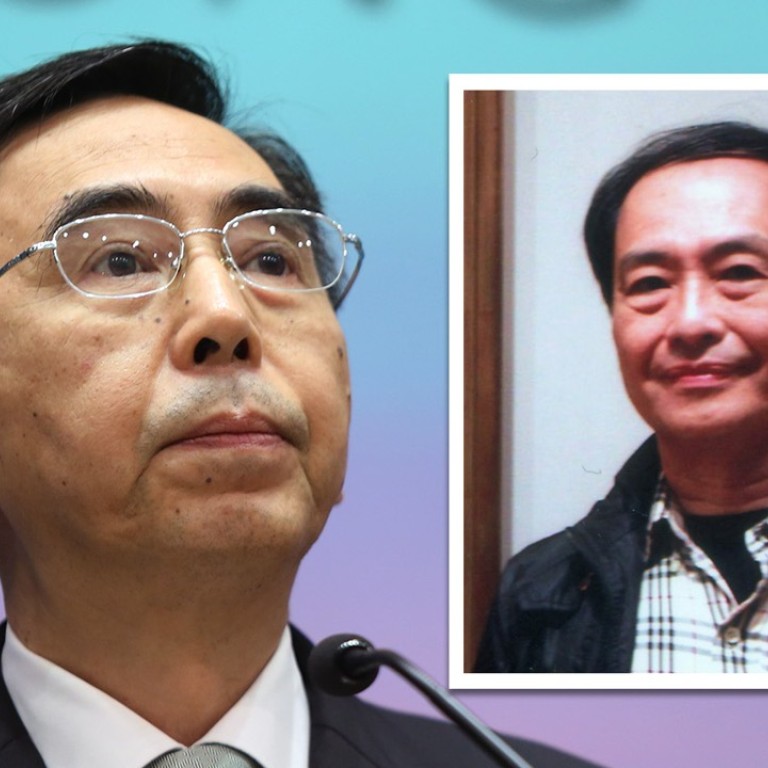
Guangdong governor says he believes case of Hong Kong bookseller Lee Po will have ‘practical and fair judgment’
Meanwhile, Britain’s publishes report on leaked document showing Beijing’s plan to ‘exterminate’ banned books and magazines at their source, targeting HK publishers
A top official in Guangdong has spoken of the mysterious disappearance of Hong Kong bookseller Lee Po, formerly reported as Lee Bo, saying that he believes there will be “a practical and fair judgement” for the matters related to his case.
Speaking after the opening ceremony of the Guangdong People’s Congress on Monday, provincial governor Zhu Xiaodan first said he did not have details on Lee’s disappearance.
“You might have to ask relevant departments in charge ... These individual issues will have to be eventually evaluated by their practical facts,” Zhu said.
READ MORE: Wife of ‘missing’ Hong Kong bookseller Lee Po reunited with husband in ‘secret’ meeting in mainland China
But he added: “I believe there will be a practical and fair judgment ... I don’t think any individual case will have an impact on the overall relationship of Guangdong, Hong Kong and Macau, in particular, Guangdong and Hong Kong. It definitely won’t.”
Li Qingxiong, deputy director of the Guangdong Public Security Department, said he had no explanation to offer when asked how Lee could have gone to the mainland without his home return permit.
Lee, a co-owner of Causeway Bay Books, a store specialising in political books banned on the mainland, disappeared in Hong Kong at the end of last month. There was no official record of him leaving the city, triggering speculation that he had been abducted by mainland law enforcement officers.
I don’t think any individual case would have an impact on the overall relationship of Guangdong, Hong Kong and Macau, in particular, Guangdong and Hong Kong.
But on early Sunday morning, it was reported that Lee had met his wife at a secret location on the mainland. He reiterated that he was “assisting in an investigation” there, but did not provide further details.
Shenzhen city police chief Liu Qinsheng yesterday refused to comment on Lee’s disappearance when he was approached by reporters.
Timeline: Hong Kong’s missing booksellers and what has happened so far
On Sunday, Britain’s Sunday Times reported that a leaked document from the Communist Party showed Beijing had plans to “exterminate” banned books and magazines at their source, identifying 14 publishing houses and 21 publications in Hong Kong as targets.
The party document, titled the “Guangdong Action Plan”, reportedly appears to authorise cross-border operations against the flourishing industry in Hong Kong selling books and magazines banned on the mainland about Chinese leaders.
It draws on a central government order dated April 25 last year launching a campaign to “wipe out at source” illegal and pornographic publications. The order identified Hong Kong and Taiwan as prime targets.
READ MORE: United States voices concern over apparent forced confessions in China
The action plan for Guangdong, the province bordering Hong Kong, reportedly endorses a “counter-attack” against booksellers, authors and their sources. “Intensify the external composite counter-attack on banned books,” it decrees.
The Times also reported that the extracts from the plan were circulating among journalists, political activists and members of the Hong Kong Legislative Council last week. But none of the legislators or publishers the Post talked to had heard of the plan.
Legco’s security panel chairman, Ip Kwok-him, who is also a local deputy to the National People’s Congress, said: “I think such a report is not very trustworthy ... because the freedom of publication is protected under the law, which means you can publish or sell these books in Hong Kong.”
But he warned that “Beijing had repeatedly said it would not allow Hong Kong to become a base for subversion”.
Labour Party lawmaker Lee Cheuk-yan, also a vice-chairman of the Alliance in Support of Patriotic Democratic Movements of China, said: “I am not surprised if such a plan or a list exists, because what the central authorities have been doing is to create a chilling effect among publishers.”
Jin Zhong, chief editor of Open Magazine and a veteran publisher of books on China, said he had not heard of the plan.
“The document may sound real but I doubt how far it could be implemented,” the Hong Kong-based China expert said.
He called the campaign to “wipe out at source”illegal publications a “mission impossible”.
“The source of banned books is the market for information, and that is based on people’s need to know and their desire for freedom and democracy, which can never be wiped out,”he said.
“I believe China does have a plan to suppress, but the objective is to control, not destroy Hong Kong,” Jin said.



